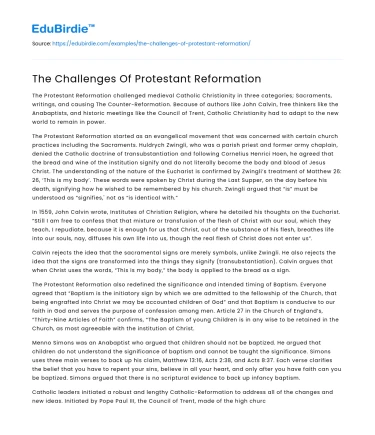The Protestant Reformation challenged medieval Catholic Christianity in three categories; Sacraments, writings, and causing The Counter-Reformation. Because of authors like John Calvin, free thinkers like the Anabaptists, and historic meetings like the Council of Trent, Catholic Christianity had to adapt to the new world to remain in power.
The Protestant Reformation started as an evangelical movement that was concerned with certain church practices including the Sacraments. Huldrych Zwingli, who was a parish priest and former army chaplain, denied the Catholic doctrine of transubstantiation and following Cornelius Henrici Hoen, he agreed that the bread and wine of the institution signify and do not literally become the body and blood of Jesus Christ. The understanding of the nature of the Eucharist is confirmed by Zwingli’s treatment of Matthew 26: 26, ‘This is my body’. These words were spoken by Christ during the Last Supper, on the day before his death, signifying how he wished to be remembered by his church. Zwingli argued that “is” must be understood as “signifies,' not as “is identical with.”
Save your time!
We can take care of your essay
- Proper editing and formatting
- Free revision, title page, and bibliography
- Flexible prices and money-back guarantee
In 1559, John Calvin wrote, Institutes of Christian Religion, where he detailed his thoughts on the Eucharist. “Still I am free to confess that that mixture or transfusion of the flesh of Christ with our soul, which they teach, I repudiate, because it is enough for us that Christ, out of the substance of his flesh, breathes life into our souls, nay, diffuses his own life into us, though the real flesh of Christ does not enter us”.
Calvin rejects the idea that the sacramental signs are merely symbols, unlike Zwingli. He also rejects the idea that the signs are transformed into the things they signify (transubstantiation). Calvin argues that when Christ uses the words, “This is my body,” the body is applied to the bread as a sign.
The Protestant Reformation also redefined the significance and intended timing of Baptism. Everyone agreed that “Baptism is the initiatory sign by which we are admitted to the fellowship of the Church, that being engrafted into Christ we may be accounted children of God” and that Baptism is conducive to our faith in God and serves the purpose of confession among men. Article 27 in the Church of England’s, “Thirty-Nine Articles of Faith” confirms, “The Baptism of young Children is in any wise to be retained in the Church, as most agreeable with the institution of Christ.
Menno Simons was an Anabaptist who argued that children should not be baptized. He argued that children do not understand the significance of baptism and cannot be taught the significance. Simons uses three main verses to back up his claim, Matthew 13:16, Acts 2:38, and Acts 8:37. Each verse clarifies the belief that you have to repent your sins, believe in all your heart, and only after you have faith can you be baptized. Simons argued that there is no scriptural evidence to back up infancy baptism.
Catholic leaders initiated a robust and lengthy Catholic-Reformation to address all of the changes and new ideas. Initiated by Pope Paul III, the Council of Trent, made of the high church cardinals and leaders, lasted 18 years. The result was a reaffirmation of the seven sacraments, selling indulgences and the belief that it is by faith and good works that we receive admittance to heaven.
Ignatius of Loyola, with the approval of Pope Paul III in 1540, established the religious order The Society of Jesus. Engaged in evangelization and education, the society played an important part in winning back to Catholicism several European countries which had for a time been predominantly Protestant. One of the main reasons Jesuits were successful is their mission was because of their ability and willingness to adapt to their surroundings. Jesuits learned languages, built schools, studied cultures and tried to answer all questions from indigenous people and sophisticated groups alike. Francis Xavier, a Jesuit in Japan, wrote of all the actions and beliefs of the people along with key military, trade, and government information. Xavier was successful because of his ability to learn the language and first prove his worth by teaching science and reason.
“They did not know that the world is round, they knew nothing of the course of the sun and stars, so that when they asked us and we explained to them these and other like things, such as the causes of comets, of the lightning and rain, they listened to us most eagerly, and appeared delighted to hear us, regarding us with profound respect as extremely learned persons. This idea of our great knowledge opened the way to us for sowing the seed of religion in their minds”.
Jesuits like Xavier were the reason why thousands of people converted to Catholicism. The Protestant Reformation was a time of great writings, re-devotion to faith, and a major change in the religious powers of the world. The ringing of Martin Luther nailing a thesis to a door reverberates to this day.






 Stuck on your essay?
Stuck on your essay?

